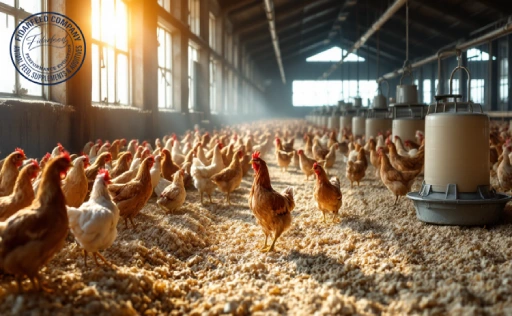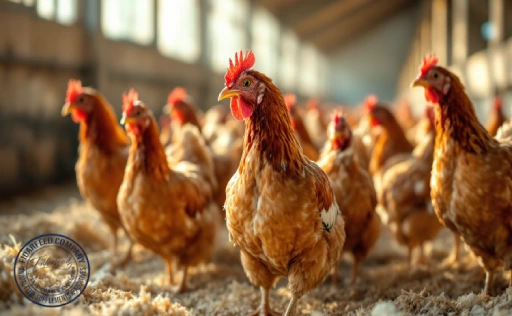
What Causes Sudden Death in Broilers is one of the most pressing questions poultry farmers face today. Losing a seemingly healthy bird without warning can be both emotionally and financially devastating. Whether you’re managing a small flock or overseeing a large-scale broiler operation, understanding the root causes and implementing effective solutions is critical. This guide explores the most common triggers behind sudden death in broilers and offers practical, science-backed strategies to help you reduce mortality and keep your flock thriving. Read on to protect your investment and give your birds the best chance at a healthy life.
Understanding What Causes Sudden Death in Broilers
Sudden death in broilers typically refers to birds dying unexpectedly without clear prior signs of illness. These incidents are particularly common in fast-growing broiler breeds, often occurring in birds aged between 2 to 5 weeks. While it may seem random, sudden death usually stems from a combination of underlying issues such as stress, poor nutrition, genetic predisposition, or metabolic disorders. Understanding these factors is the first step in reducing losses and improving flock health.
Learn more about: Processed Meat Meal
Metabolic Disorders and What Causes Sudden Death in Broilers
One of the leading contributors to sudden death in broilers is Sudden Death Syndrome (SDS), also known as “Flip-Over Disease.” This condition is closely linked to metabolic stress caused by rapid growth and high-energy feed. Affected birds are often found lying on their backs, with no previous signs of illness.
Learn more about: Mastering the Basics: A Comprehensive Broiler Breeder Management Guide
Scientific research, including studies published in Poultry Science, shows that SDS is more prevalent in males and in flocks fed high-energy diets. The underlying cause is believed to be an imbalance between the bird’s metabolic rate and its cardiovascular capacity. Essentially, the heart can’t keep up with the body’s rapid growth.
Nutritional Imbalances: A Hidden Trigger Behind Sudden Losses
Feed formulation plays a major role in broiler health. Diets that are too rich in energy but lacking in essential nutrients like vitamin E, selenium, or electrolytes can predispose birds to sudden death.
For example, insufficient vitamin E and selenium have been linked to nutritional myopathy, which weakens muscle tissue, including the heart. Similarly, an imbalance in calcium and phosphorus levels can lead to skeletal issues and systemic stress.
Learn more about: Ross 308 vs. Cobb 500: Which Broiler Breed is Right for You?
Consulting with a poultry nutritionist can help ensure feed rations are balanced, digestible, and appropriate for your birds’ age and growth stage.
Environmental Stressors That Can Lead to Sudden Death in Broilers
Stress is a silent killer in poultry production. High temperatures, poor ventilation, overcrowding, and inconsistent lighting can all contribute to sudden death. Heat stress, in particular, puts enormous pressure on a broiler’s cardiovascular and respiratory systems.
Learn more about: how to breed broiler chickens
In hot climates or poorly ventilated houses, birds may pant excessively, eat less, and experience heat stroke, sometimes resulting in death within minutes. Proper housing design, airflow management, and cooling systems are essential.
Even minor daily stressors — such as loud noises or abrupt lighting changes — can disrupt feeding and resting cycles, further weakening the birds’ immune systems.
The Impact of Genetic Selection and Rapid Growth Rates
Modern broilers have been selectively bred for incredibly fast growth and high feed efficiency. While this improves productivity, it also increases vulnerability to sudden death.
Learn more about: Broiler Chicken Health at Risk? Know the Signs of Dysentery
Rapid muscle development can outpace the development of internal organs like the heart and lungs. This imbalance puts added strain on the cardiovascular system, making sudden death more likely under conditions of physical stress or dietary imbalance.
It’s essential for breeders and farmers alike to strike a balance between growth performance and animal welfare.
Heart and Respiratory Failures in Broilers: What You Need to Know
Another common cause of sudden death is ascites, or fluid buildup in the abdominal cavity, often due to right-sided heart failure. Broilers raised at high altitudes or under poor ventilation are especially prone to this condition due to oxygen deprivation.
Learn more about: Cobb 500: The Broiler Breeder’s First Choice – Unveiled
Respiratory challenges like infectious bronchitis or mycoplasma can also compromise lung function, making it harder for birds to cope with stress or heat.
Regular health checks and respiratory monitoring are vital in early detection and prevention of these silent killers.
Best Farm Management Practices to Reduce Sudden Death in Broilers
Good management is the backbone of a healthy broiler operation. Here are some proven practices:
- Maintain proper litter quality to reduce ammonia buildup
- Use gradual lighting programs to prevent stress
- Monitor flock behavior daily to catch problems early
- Avoid feed withdrawal during the hottest part of the day
Simple changes like spacing feeders correctly or ensuring clean, fresh water can make a noticeable difference in reducing stress and mortality.
Early Signs of What Causes Sudden Death in Broilers You Shouldn’t Ignore
Though sudden death is often unpredictable, there are subtle signs that something may be wrong:
- Irregular breathing or open-mouth panting
- Lethargy and reduced feed intake
Learn more about: The Ultimate Guide to Broiler House Ventilation
- Birds lying on their sides or isolated from the group
- Sudden collapse during feeding or activity
Tracking these symptoms in real time helps you respond swiftly. Early intervention can be the key to saving lives.
Veterinary Support and Diagnostic Tools for Broiler Mortality
When unexplained deaths occur, veterinary consultation is crucial. A necropsy — post-mortem examination — can identify the exact cause and guide future prevention.
Laboratory tests can detect pathogens, nutrient deficiencies, and organ damage. Technologies like PCR and ELISA help pinpoint viral and bacterial infections that may not be obvious during life.
Regular vet visits and laboratory support can also provide valuable feedback on the effectiveness of your vaccination and biosecurity programs.
Preventative Solutions Every Broiler Breeder Should Implement
Prevention is always better than treatment. Here are proactive steps every broiler breeder should consider:
- Adjust feed formulations to match age and growth stage
- Implement controlled lighting schedules
- Use antioxidants like vitamin E and selenium
Learn more about: Sudden Dietary Changes and Broiler Performance: Causes, Effects, and Solutions
- Ensure proper ventilation and temperature control
- Introduce gradual growth strategies through feed restriction, if needed
- Train staff to recognize stress behaviors early
Also, focus on biosecurity. Preventing disease entry and spread can reduce both acute infections and the added stress that can tip vulnerable birds into sudden death.
Conclusion
Sudden death in broilers is a multifactorial issue, but with knowledge, attention, and action, it can be significantly reduced. From managing metabolic and nutritional factors to improving environmental conditions and flock management, each step plays a role in safeguarding your birds.
Understanding what causes sudden death in broilers isn’t just about science — it’s about protecting your investment and ensuring ethical, sustainable poultry farming.
If you’ve faced challenges with broiler mortality or have effective strategies to share, we’d love to hear from you. Leave a comment below, ask a question, or share your story — because when farmers share knowledge, everyone benefits.







